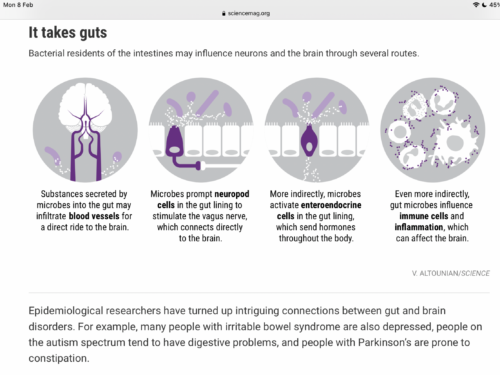We know there is a connection between our mind and our gut because we feel it. That sinking feeling when we hear bad news, the ‘butterflies’ when we get excited, the loss of appetite when we feel stressed. These are some of the ways our mind and body communicate. It’s not always immediate or obvious that our mental states are having an effect on our body, but it’s now known that gut bacteria change in response to different emotions. In the last decade revolutionary research has discovered the complex interactions between the brain, gut and emotions, and how the microbiome in our intestines affect our mental health, mood and thoughts.
In Emeran Mayer’s book The Mind-Gut Connection he refers to the digestive system as a supercomputer – complex and powerful, influencing our emotions, sensitivity and even our decision making. The enteric nervous system(ENS) within the gut is often called the ‘second brain’ because it is made up of millions of nerve cells. Thick bands of nerves communicate information back and forth, signalling a variety of triggers, responses and feelings. This bidirectional(two-way) pathway, known as the brain-gut axis processes information that produces ‘gut reactions’. These gut reactions ultimately affect every aspect of lives, from the food we eat to the people we spend time with, basically every decision we make.
In 2007 the Human Microbiome Project made some major discoveries about the influence of the human microbiome on health and disease. The diversity of our microflora has a profound impact on our health – helping to digest food, modulate the immune system, regulate metabolism and detoxify harmful substances. Conversely, diminished microbial diversity is associated with a variety of digestive problems, allergies, immune disfunction and even neurodegenerative brain disorders.
The relationship between mood disorders and digestive function is generating a lot of interesting research. Some microorganisms in the gut have been shown to have a a direct effect on depression and anxiety by influencing the neurotransmitter, serotonin, which is produced by specialised cells in the intestinal wall. Mayer says, “your gut microbes are in a prime position to influence your emotions, by generating and modulating signals the gut sends back to the brain”. There is now a large body of research showing that some of the most serious brain and emotional disorders are related to changes in the gut microbiome, and the way these microbes communication with the brain.
This chart found on https://www.sciencemag.org/news/2020/05/meet-psychobiome-gut-bacteria-may-alter-how-you-think-feel-and-act clearly explains the various pathways gut bacteria can use to hijack your behaviour.

We know the gut plays a major role in wellbeing, both physical and mental, so in order to address any underlying health problems or to simply optimise your overall wellbeing, gut health is where to start.
5 September 2024, Information
24 July 2024, Information
9 March 2023, News
11 July 2024, Playlist
28 February 2024, Playlist
31 August 2023, Playlist